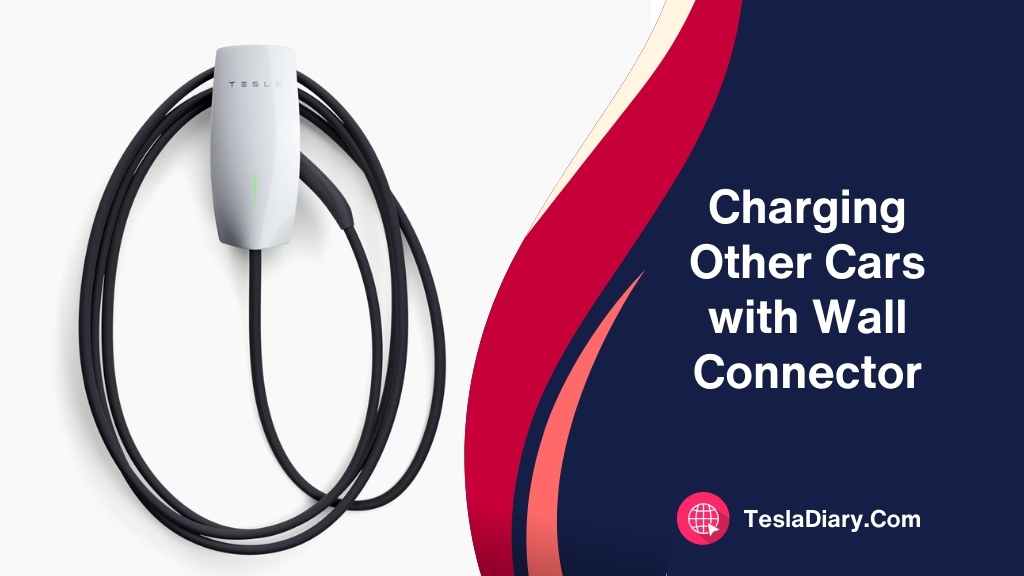Electric vehicles (EVs) have gained tremendous popularity in recent years, and Tesla, as a pioneer in the EV industry, has played a significant role in advancing charging infrastructure.
Tesla offers its own charging solution, known as the Tesla Wall Connector, designed primarily for Tesla vehicles. However, many EV enthusiasts wonder if this impressive piece of technology can be used to charge non-Tesla electric vehicles.
In this article, we will explore the compatibility of the Tesla Wall Connector with other EVs and the implications of using it for non-Tesla vehicles.

Understanding the Tesla Wall Connector
The Tesla Wall Connector is a home charging station that allows Tesla owners to charge their vehicles conveniently and efficiently. It is known for its sleek design and user-friendly features, making it a popular choice among Tesla owners.
The Wall Connector typically comes with a Tesla-specific connector, designed to work seamlessly with Tesla cars. Tesla has developed a proprietary charging technology, which can raise questions about its compatibility with other EVs.
Tesla Wall Connector Compatibility
Can it charge non-Tesla electric vehicles?
Yes, you can charge non-Tesla electric vehicles with the new Universal Wall Connector. Previously, the Tesla Wall Connector was optimized for Tesla’s proprietary charging protocol, and the connector was designed to fit only Tesla vehicles.
However, Tesla has recognized the importance of interoperability in the EV charging ecosystem and announced the new Universal Wall Connector to cater to non-Tesla EV owners.
Got confused? Read our Comparison of the Tesla Wall Connector and the Universal Wall Connector.
Types of connectors and adapters available
To charge non-Tesla electric vehicles with a Tesla Wall Connector, you’ll need a Tesla-to-J1772 adapter. J1772 is a standard charging connector used by most non-Tesla EVs in North America. Tesla provides this adapter, which allows you to connect the Wall Connector to your non-Tesla EV.
If you do not have a Wall Connector, I recommend buying a Universal Wall Connector which will allow you to charge non-Tesla vehicles without any additional adapter or accessories.
Limitations in compatibility with non-Tesla EVs
While the Tesla Wall Connector can technically charge non-Tesla electric vehicles with the right adapter, there are limitations. The charging speed and capabilities may vary depending on your non-Tesla EV’s specifications.
However, some high-end J1772 adapters can charge at the full output of 11.5 kW of Wall Connector, the same rate as charging a Tesla vehicle.
Additionally, it’s essential to consider safety and warranty implications when using adapters or modifications, as they may void warranties or pose risks if not used correctly.
Adapters and Modifications
Tesla-to-J1772 adapter
The Tesla-to-J1772 adapter is a crucial accessory for charging non-Tesla EVs with a Tesla Wall Connector. It allows you to connect your non-Tesla EV’s J1772 charging port to the Wall Connector. Tesla provides this adapter for purchase through their official channels.
Tesla Wall Connector modifications for non-Tesla EVs
Some enterprising EV enthusiasts have explored modifications and hacks to make the Tesla Wall Connector more compatible with non-Tesla EVs. While these DIY solutions may work, they come with risks and can void warranties. It’s essential to proceed with caution and ensure that any modifications adhere to safety standards.
Safety considerations and warranty implications
Using adapters or modifications to charge non-Tesla EVs with a Tesla Wall Connector can have safety and warranty implications. Tesla may not take responsibility for any damage caused by using non-standard adapters or modifications.
It’s crucial to read and understand your EV manufacturer’s guidelines and warranty terms before attempting to use a Tesla Wall Connector in this manner.
Benefits and Drawbacks
Advantages of using a Tesla Wall Connector for non-Tesla EVs
- Convenience: If you already have a Tesla Wall Connector installed at home for your Tesla vehicle, it can be convenient to use the same charger for other EVs with the right adapter.
- Cost Savings: Purchasing a Tesla Wall Connector may be more cost-effective than installing a separate charging station for non-Tesla EVs.
Limitations and drawbacks
- Limited Compatibility: While the Wall Connector can charge non-Tesla EVs, it may not provide the same charging speed or convenience as dedicated universal Level 2 chargers.
- Safety Concerns: Adapters and modifications can pose safety risks if not used correctly.
- Warranty Implications: Using non-standard adapters or modifications may void warranties.
Alternative Charging Solutions
Public charging networks
Public charging networks, such as ChargePoint and EVgo, offer universal Level 2 chargers that are compatible with a wide range of EVs. These networks provide a convenient and reliable option for charging non-Tesla electric vehicles.
Universal Level 2 chargers
Universal Level 2 chargers are designed to work with a variety of EVs, making them a versatile and future-proof charging solution. They can be installed at home or found at public charging stations.
Tesla Superchargers vs. Tesla Wall Connector for non-Tesla EVs
Tesla Superchargers are high-speed charging stations specifically designed for Tesla vehicles. While they can technically charge non-Tesla EVs with adapters, they are optimized for Tesla’s proprietary technology.
Using a Tesla Supercharger for non-Tesla EVs is less practical compared to using a Tesla Wall Connector with the appropriate adapter.
Conclusion
The Tesla Wall Connector can be used to charge non-Tesla electric vehicles with the right adapters and modifications. However, there are limitations, safety considerations, and potential warranty implications to be aware of.
Before using a Tesla Wall Connector for non-Tesla EVs, it’s essential to research and understand the specific requirements of your EV and consult with the manufacturer if needed.
As the EV market continues to evolve, interoperability and collaboration among automakers and charging infrastructure providers will become increasingly important for the convenience and accessibility of EV charging for all.

